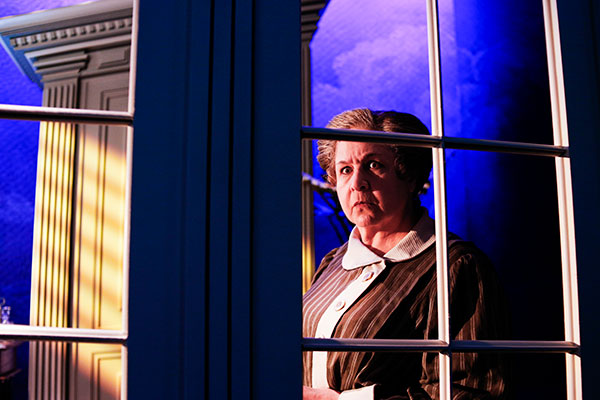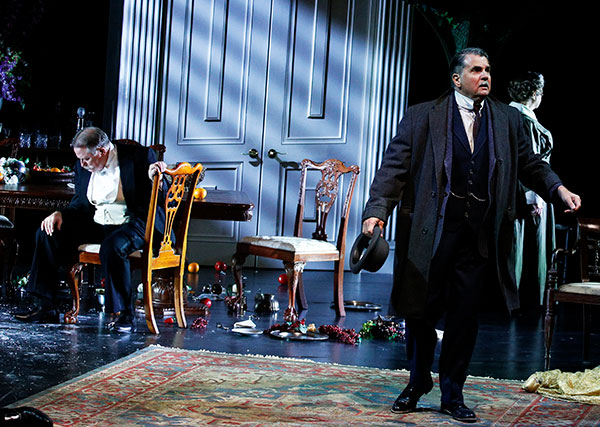If you crave the suspenseful style of Alfred Hitchcock paired with the mind-boggling twists of The Twilight Zone then look no further than An Inspector Calls, onstage at the Maltz Jupiter Theatre through February 18.

This unconventional crime thriller by J.B. Priestley has been enticing audiences since the 1940s, when it premiered in the Soviet Union and then the United Kingdom. It takes place on a spring evening in 1912 in the industrial city of Brumley in Yorkshire. The well-to-do Birling family has just finished a celebratory meal honoring the engagement of their daughter, Sheila, to the even-more-well-to-do Gerald Croft.
Before they can all retire to the drawing room, a peculiar stranger arrives. He identifies himself as Inspector Goole, and claims he’s there to investigate a recent suicide. The deceased is Eva Smith (also known as Daisy Renton), a woman each family member has wronged in some way or another. Goole goads the Birlings and Croft into admitting their involvement, sending them all into a self-actualizing spiral that forces them to reflect upon their behavior and treatment of others. That is, until they realize Goole himself may not be exactly who he claims to be.

Director J. Barry Lewis and the creative team at Maltz Jupiter Theatre do an excellent job of layering this thriller like an onion, gradually peeling away layers of visual metaphors and character pretense to reveal a truly chilling examination of the human experience. While the Birlings believe every man must make his own way in this world, Goole reminds them that we’re all in this together. Each action—good or bad—has a consequence, and everyone must be held accountable for the pain they inflict on their fellow man.
This staging of An Inspector Calls boasts absolutely exquisite production design. Every element, from the set to the sound to the lighting, imbues another level of meaning to the play as a whole.
Just look at the scenic design by Victor A. Becker. When the play opens, a pair of windows and a lone door frame obstruct the audience’s view of the Birlings conversing at the table. This immediately places you—much like Inspector Goole, who enters from the audience—into the role of voyeur. As Goole comes in, those pieces rise into the rafters, welcoming you into the family’s well-appointed dining room to begin the process of breaking down their façades.

Throughout the play, which is staged without an intermission, sound designer and composer Marty Mets accents moments of terror, realization, and fury with musical flourishes. As with any good score, these compositions serve to heighten the drama and draw the audience into the action. The audio is further enhanced by Kirk Bookman’s innovative lighting design, which involves quite a few wow moments that I won’t spoil here.
The cast of An Inspector Calls is equally sublime. It’s packed with South Florida theater veterans, including two-time Carbonell Award nominee Rob Donohoe and Angie Radosh, who earned a Carbonell for her turn as Fraulein Schneider in the Maltz’s production of Cabaret. Here, Donohoe and Radosh portray Mr. and Mrs. Birling, two characters resigned to their single-minded view of the world and headstrong in their selfish approach to life.

Perhaps one of the most haunting elements of An Inspector Calls is the ever-present service staff. Elizabeth Dimon (another Maltz favorite) has a handful of lines as Edna, all of which are delivered with an eerie stoicism. But while the rest of the maids and footmen are speechless, they are almost always in sight, either slowly moving pieces of the set, picking up after the Birlings, or simply sitting idly on the edge of the stage. There’s certainly some symbolism here—especially in the context of the play’s socialist themes—but, as with much of An Inspector Calls, it’s all up to interpretation.








Facebook Comments